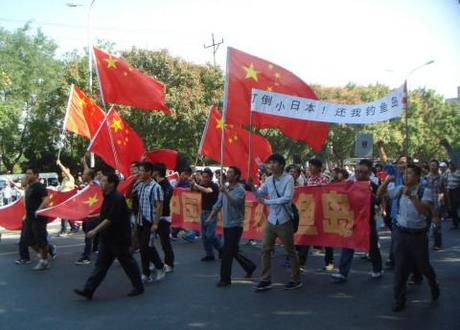 Anti-Japanese Protests as a result of the dispute. Photo Credit: Flickr.
Anti-Japanese Protests as a result of the dispute. Photo Credit: Flickr.
The background
The Senkaku Islands, three seemingly inconspicuous, uninhabited islands in the East China Sea, are at the center of a hotly contested territorial dispute between China and Japan. Earlier this month, Japan purchased the islands from its Japanese private owners and sparked vicious anti-Japanese protests across China, who believe the islands were unlawfully seized by Japan in 1895. This week a flotilla of armed Chinese patrol ships moved in to the surrounding waters of the Senkaku Islands, igniting fears that this disagreement could provoke all-out war.
An ‘Asian Falklands’
A spokesman for the Chinese defence ministry, Geng Yansheng, justified China’s decision to send surveillance ships to the islands. He said in a statement, reported by The Guardian: “The determination and the will of the Chinese government and military to safeguard their territorial integrity are firm. We are closely monitoring the situation and reserve the right to take necessary measures.” The Guardian also reported the latest from People’s Liberation Army Daily, the main newspaper of China’s military, which called Japan’s move “the most blatant challenge to China’s sovereignty since the end of the Second World War.” The Times called it “the Asian version of the Falklands/ Malvinas quarrel” and added, “Like the Falklands clash, the confrontation is not really about an identifiable paper trail of sovereignty, but about national pride, a shifting balance of power, historical self-image, domestic politics and, above all, oil.” The situation is delicate and, US Defence Secretary, Leon Panetta, remarked last weekend: “A misjudgment on one side or the other could result in violence and could result in conflict.”
Old wounds and an ancient rivalry
The dispute over the islands is one that touches upon centuries of rivalry between the two nations. The Times noted that the anti-Japanese protests in China fell on the anniversary Japan’s invasion of Manchuria in 1931: “The wounds from its brutal 14-year occupation of Northern China have never been allowed to heal, with many Chinese convinced that Japan has never properly atoned for its wartime crimes.” Nicholas D. Kristof of The New York Times noted how the dispute is opening up old war wounds: “The most interesting evidence is emerging from old Japanese government documents and suggests that Japan in effect stole the islands from China in 1895 as booty of war.” Taiwanese scholar Han-Yi Shaw, who has conducted meticulous research on the subject, wrote for The New York Times that Japanese Government documents from the late 19th century: “leave no doubt that the Meiji government did not base its occupation of the islands following ‘on-site surveys time and again,’ but instead annexed them as booty of war. This is the inconvenient truth that the Japanese government has conveniently evaded.”
Devastating consequences
The Japan Times noted the fragility of both Japan and China’s economy, adding, “The last thing that China needs today is a war with Japan.” The paper also acknowledged the murky diplomatic waters that China is testing by sending in their military to the islands: “Beijing is keeping up the pressure and economic threats and trying to drive a wedge between Washington and Tokyo.” The Telegraph also observed the dangerous game that China is playing: “With the Chinese economy slowing fast, and a difficult leadership transition still to navigate, the frenzy of anti-Japanese feeling very much fits Beijing’s domestic purposes. In a land without state-sponsored religion, nationalism is the new opium of the people.” But a cessation of trade between the two counties would harm China just as much as Japan. Both countries, according to The Japan Times, seem unwilling to acknowledge the very real danger of their actions: “Even Chinese writers who don’t care for the Communist Party say they feel pride in the islands and would fight to prevent Japan’s sovereignty. Japan has its own nationalists, and neither country seems to understand the damage that a skirmish could do, let alone war.”
More in world
- Japan, one year after the tsunami
- Protest over Fukushima re-opening

